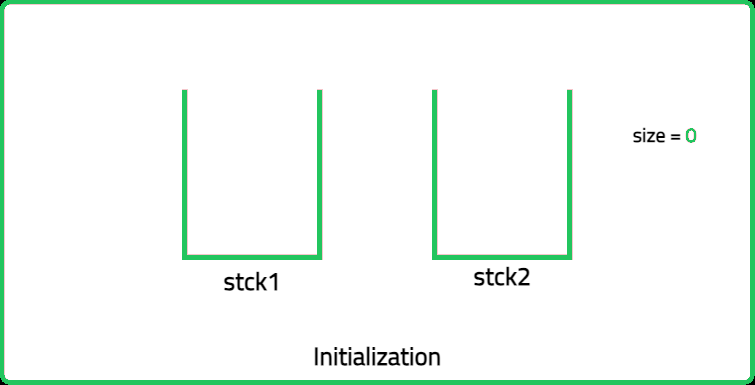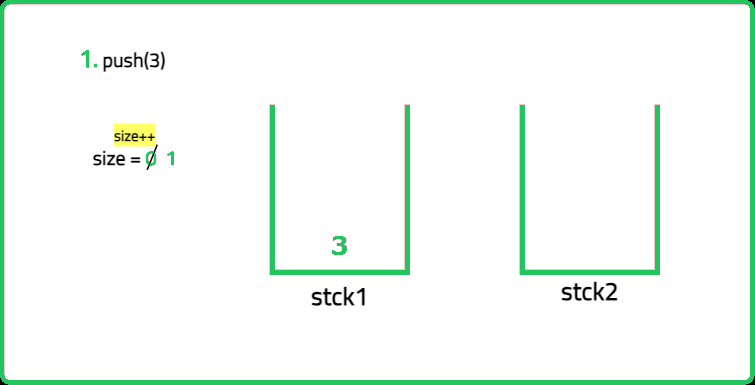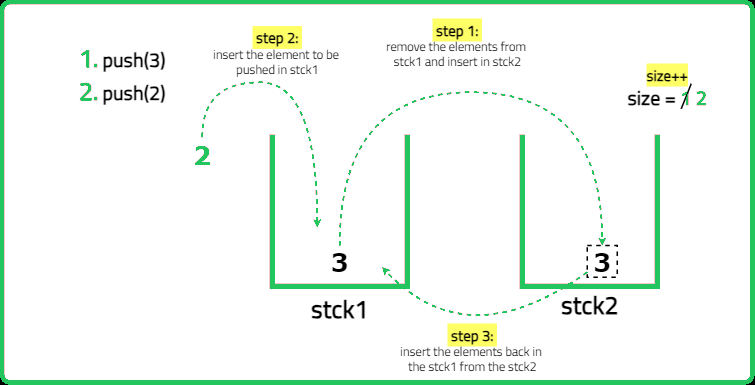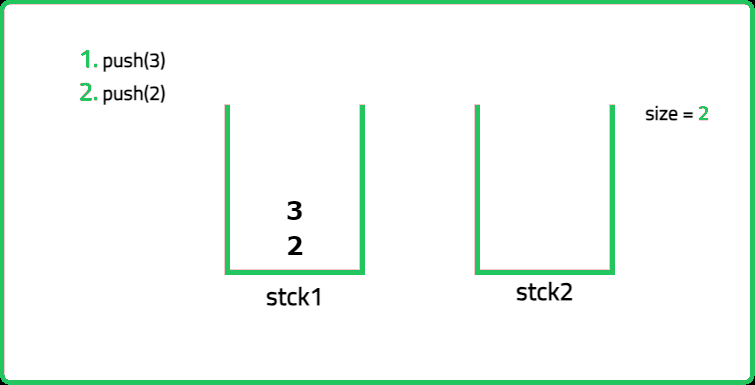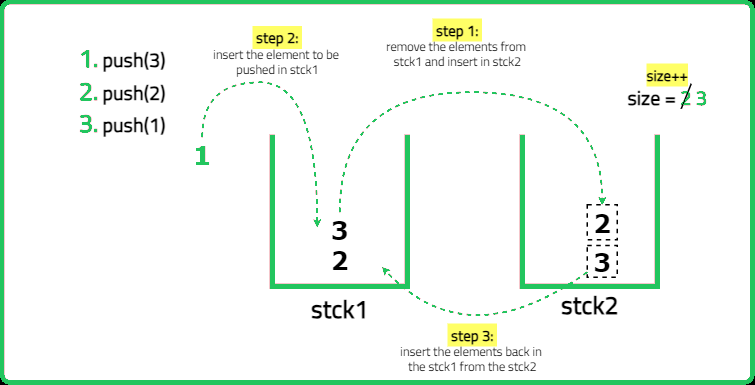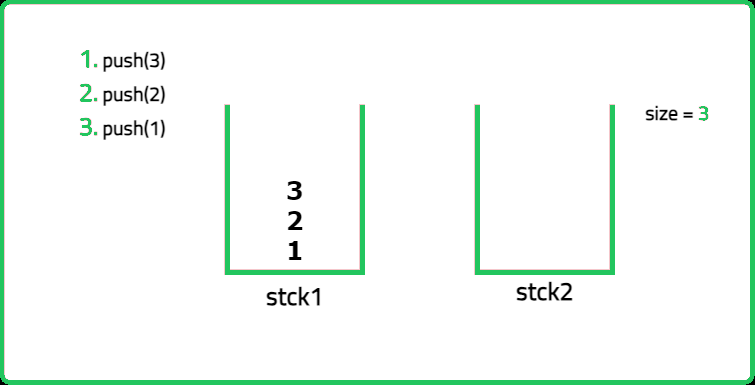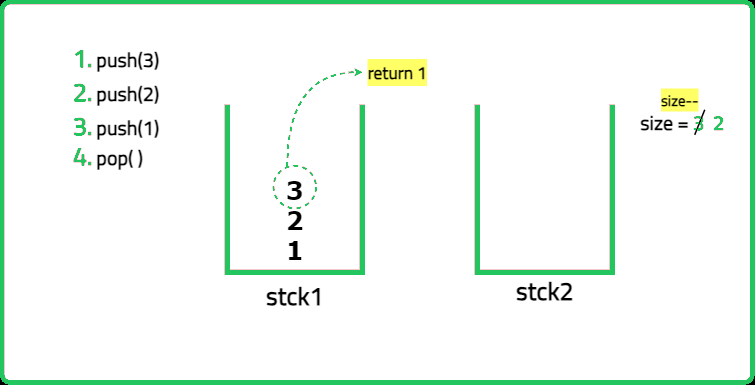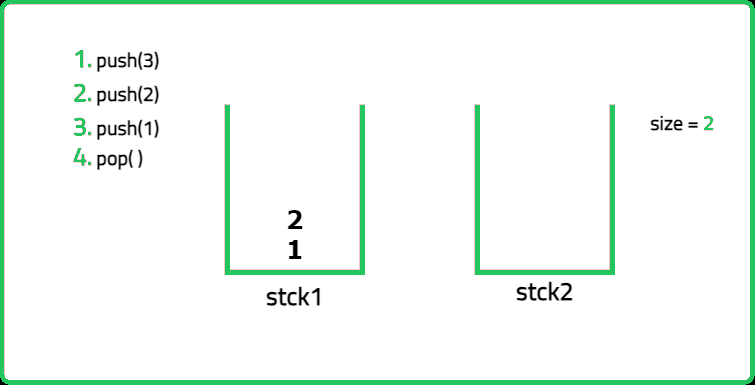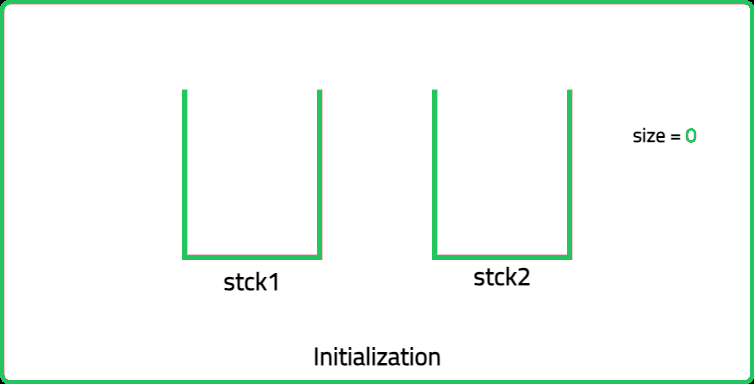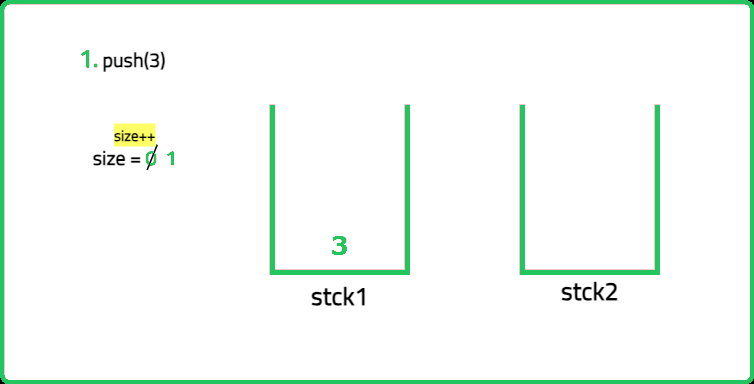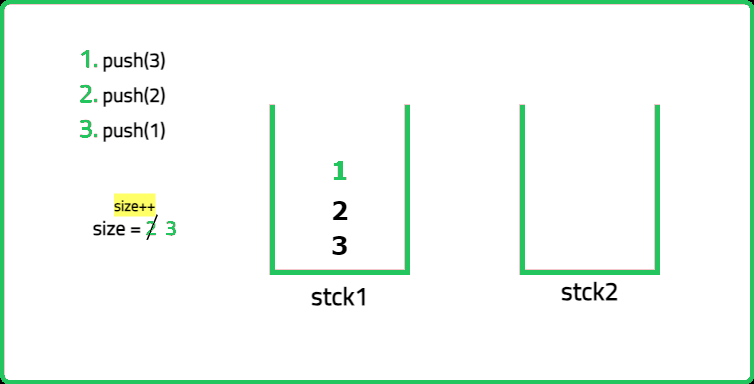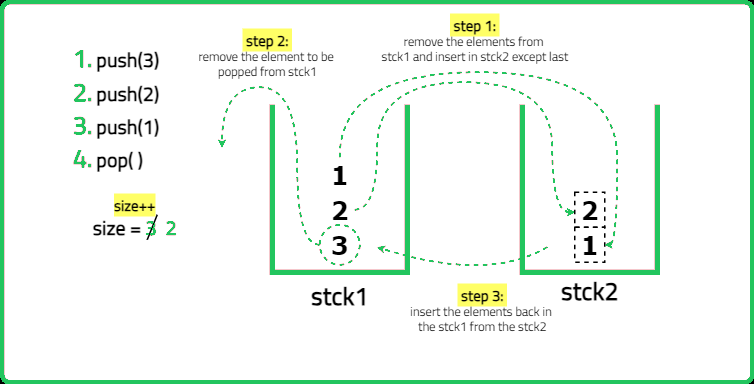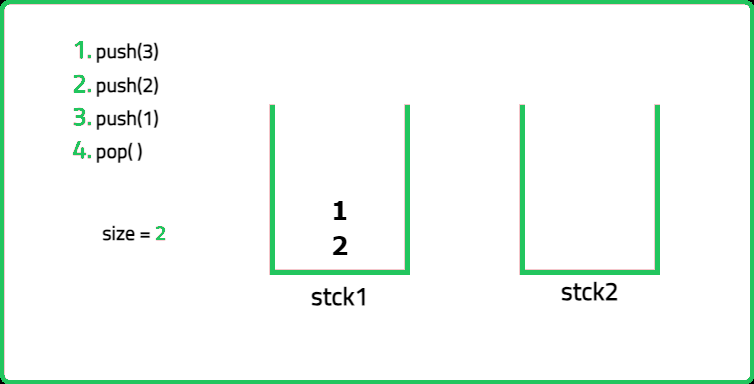123456789101112131415161718192021222324252627282930313233343536373839404142434445464748495051525354555657585960616263646566676869707172737475767778798081828384858687888990919293
#include <bits/stdc++.h>
using namespace std;
// Queue implementation using stack
class StackQueue {
private:
stack <int> st1, st2;
public:
// Empty Constructor
StackQueue () {
}
// Method to push elements in the queue
void push(int x) {
/* Pop out elements from the first stack
and push on top of the second stack */
while (!st1.empty()) {
st2.push(st1.top());
st1.pop();
}
// Insert the desired element
st1.push(x);
/* Pop out elements from the second stack
and push back on top of the first stack */
while (!st2.empty()) {
st1.push(st2.top());
st2.pop();
}
}
// Method to pop element from the queue
int pop() {
// Edge case
if (st1.empty()) {
cout << "Stack is empty";
return -1; // Representing empty stack
}
// Get the top element
int topElement = st1.top();
st1.pop(); // Perform the pop operation
return topElement; // Return the popped value
}
// Method to get the front element from the queue
int peek() {
// Edge case
if (st1.empty()) {
cout << "Stack is empty";
return -1; // Representing empty stack
}
// Return the top element
return st1.top();
}
// Method to find whether the queue is empty
bool isEmpty() {
return st1.empty();
}
};
int main() {
StackQueue q;
// List of commands
vector<string> commands = {"StackQueue", "push", "push",
"pop", "peek", "isEmpty"};
// List of inputs
vector<vector<int>> inputs = {{}, {4}, {8}, {}, {}, {}};
for (int i = 0; i < commands.size(); ++i) {
if (commands[i] == "push") {
q.push(inputs[i][0]);
cout << "null ";
} else if (commands[i] == "pop") {
cout << q.pop() << " ";
} else if (commands[i] == "peek") {
cout << q.peek() << " ";
} else if (commands[i] == "isEmpty") {
cout << (q.isEmpty() ? "true" : "false") << " ";
} else if (commands[i] == "StackQueue") {
cout << "null ";
}
}
return 0;
}
123456789101112131415161718192021222324252627282930313233343536373839404142434445464748495051525354555657585960616263646566676869707172737475767778798081828384858687
import java.util.*;
class StackQueue {
private Stack<Integer> st1, st2;
// Constructor
public StackQueue() {
st1 = new Stack<>();
st2 = new Stack<>();
}
// Method to push elements in the queue
public void push(int x) {
/* Pop out elements from the first stack
and push on top of the second stack */
while (!st1.isEmpty()) {
st2.push(st1.pop());
}
// Insert the desired element
st1.push(x);
/* Pop out elements from the second stack
and push back on top of the first stack */
while (!st2.isEmpty()) {
st1.push(st2.pop());
}
}
// Method to pop element from the queue
public int pop() {
// Edge case
if (st1.isEmpty()) {
System.out.println("Stack is empty");
return -1; // Representing empty stack
}
// Get the top element
int topElement = st1.pop(); // Perform the pop operation
return topElement; // Return the popped value
}
// Method to get the front element from the queue
public int peek() {
// Edge case
if (st1.isEmpty()) {
System.out.println("Stack is empty");
return -1; // Representing empty stack
}
// Return the top element
return st1.peek();
}
// Method to find whether the queue is empty
public boolean isEmpty() {
return st1.isEmpty();
}
}
class Main {
public static void main(String[] args) {
StackQueue q = new StackQueue();
// List of commands
String[] commands = {"StackQueue", "push", "push",
"pop", "peek", "isEmpty"};
// List of inputs
int[][] inputs = {{}, {4}, {8}, {}, {}, {}};
for (int i = 0; i < commands.length; i++) {
if (commands[i].equals("push")) {
q.push(inputs[i][0]);
System.out.print("null ");
} else if (commands[i].equals("pop")) {
System.out.print(q.pop() + " ");
} else if (commands[i].equals("peek")) {
System.out.print(q.peek() + " ");
} else if (commands[i].equals("isEmpty")) {
System.out.print((q.isEmpty() ? "true" : "false") + " ");
} else if (commands[i].equals("StackQueue")) {
System.out.print("null ");
}
}
}
}
123456789101112131415161718192021222324252627282930313233343536373839404142434445464748495051525354555657585960616263646566
class StackQueue:
def __init__(self):
# Constructor
self.st1 = []
self.st2 = []
# Method to push elements in the queue
def push(self, x):
'''Pop out elements from the first stack
and push on top of the second stack'''
while self.st1:
self.st2.append(self.st1.pop())
# Insert the desired element
self.st1.append(x)
'''Pop out elements from the second stack
and push back on top of the first stack'''
while self.st2:
self.st1.append(self.st2.pop())
# Method to pop element from the queue
def pop(self):
# Edge case
if not self.st1:
print("Stack is empty")
return -1 # Representing empty stack
# Get the top element
top_element = self.st1.pop() # Perform the pop operation
return top_element # Return the popped value
# Method to get the front element from the queue
def peek(self):
# Edge case
if not self.st1:
print("Stack is empty")
return -1 # Representing empty stack
# Return the top element
return self.st1[-1]
# Method to find whether the queue is empty
def is_empty(self):
return not self.st1
if __name__ == "__main__":
q = StackQueue()
# List of commands
commands = ["StackQueue", "push", "push", "pop", "peek", "isEmpty"]
# List of inputs
inputs = [[], [4], [8], [], [], []]
for i in range(len(commands)):
if commands[i] == "push":
q.push(inputs[i][0])
print("null", end=" ")
elif commands[i] == "pop":
print(q.pop(), end=" ")
elif commands[i] == "peek":
print(q.peek(), end=" ")
elif commands[i] == "isEmpty":
print("true" if q.is_empty() else "false", end=" ")
elif commands[i] == "StackQueue":
print("null", end=" ")
12345678910111213141516171819202122232425262728293031323334353637383940414243444546474849505152535455565758596061626364656667686970717273747576
class StackQueue {
constructor() {
// Constructor
this.st1 = [];
this.st2 = [];
}
// Method to push elements in the queue
push(x) {
/* Pop out elements from the first stack
and push on top of the second stack */
while (this.st1.length) {
this.st2.push(this.st1.pop());
}
// Insert the desired element
this.st1.push(x);
/* Pop out elements from the second stack
and push back on top of the first stack */
while (this.st2.length) {
this.st1.push(this.st2.pop());
}
}
// Method to pop element from the queue
pop() {
// Edge case
if (!this.st1.length) {
console.log("Stack is empty");
return -1; // Representing empty stack
}
// Get the top element
return this.st1.pop(); // Perform the pop operation
}
// Method to get the front element from the queue
peek() {
// Edge case
if (!this.st1.length) {
console.log("Stack is empty");
return -1; // Representing empty stack
}
// Return the top element
return this.st1[this.st1.length - 1];
}
// Method to find whether the queue is empty
isEmpty() {
return this.st1.length === 0;
}
}
const q = new StackQueue();
// List of commands
const commands = ["StackQueue", "push", "push", "pop", "peek", "isEmpty"];
// List of inputs
const inputs = [[], [4], [8], [], [], []];
for (let i = 0; i < commands.length; i++) {
if (commands[i] === "push") {
q.push(inputs[i][0]);
console.log("null");
} else if (commands[i] === "pop") {
console.log(q.pop());
} else if (commands[i] === "peek") {
console.log(q.peek());
} else if (commands[i] === "isEmpty") {
console.log(q.isEmpty() ? "true" : "false");
} else if (commands[i] === "StackQueue") {
console.log("null");
}
}
